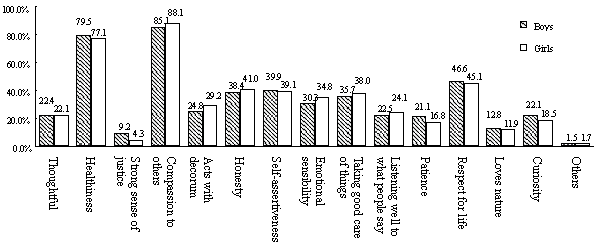| |
2nd Survey |
| Total |
Feel burdensome |
Do not feel burdensome in particular |
| |
Physical burdens |
Financial burdens |
Lack of free time |
Lack of time with partners |
Unable to work enough |
Lack of familiar persons' understanding |
Being prone to illness |
Constant tension due to the active child |
Others |
| 3rd Survey |
Total |
(100.0) |
(85.5) |
(39.4) |
(26.9) |
(64.0) |
(24.9) |
(16.1) |
(6.0) |
(6.3) |
(34.1) |
(3.9) |
(12.2) |
| 100.0 |
100.0 |
100.0 |
100.0 |
100.0 |
100.0 |
100.0 |
100.0 |
100.0 |
100.0 |
100.0 |
100.0 |
| Feel burdensome |
86.2 |
90.8 |
94.1 |
94.1 |
92.6 |
93.8 |
92.7 |
96.1 |
93.3 |
93.8 |
90.8 |
54.6 |
| |
Physical burdens |
32.0 |
35.3 |
54.9 |
40.7 |
37.3 |
41.3 |
38.3 |
50.5 |
41.3 |
43.6 |
35.0 |
9.4 |
| Financial burdens |
25.8 |
28.1 |
32.3 |
56.3 |
27.8 |
31.6 |
35.6 |
35.6 |
37.5 |
30.2 |
28.9 |
10.2 |
| Lack of free time |
58.6 |
63.9 |
69.1 |
64.1 |
73.0 |
75.8 |
67.5 |
71.4 |
61.4 |
68.6 |
58.7 |
23.0 |
| Lack of partner's involvement in child rearing |
6.2 |
6.7 |
8.1 |
7.9 |
7.1 |
7.2 |
8.7 |
22.6 |
9.0 |
8.2 |
9.2 |
2.8 |
| Parental disagreement in discipline |
9.5 |
9.9 |
10.5 |
11.0 |
10.0 |
11.0 |
12.8 |
24.0 |
14.0 |
11.7 |
13.7 |
6.5 |
| Unable to work or do housework enough |
20.1 |
22.2 |
27.3 |
26.2 |
24.1 |
28.0 |
43.3 |
35.9 |
32.2 |
26.1 |
28.7 |
6.0 |
| Concerned about what people talk about the child |
5.2 |
5.5 |
6.6 |
6.7 |
5.8 |
7.5 |
6.2 |
11.3 |
7.1 |
7.7 |
8.0 |
2.6 |
| Constant tension due to the active child |
22.8 |
24.9 |
30.6 |
27.4 |
26.2 |
28.9 |
25.7 |
34.5 |
26.3 |
42.1 |
24.8 |
8.4 |
| Unable to build good relationship with other parents |
1.2 |
1.3 |
1.7 |
1.7 |
1.4 |
1.7 |
1.5 |
3.2 |
1.6 |
1.7 |
2.2 |
0.4 |
| No caregiver when temporary childcare is needed |
12.0 |
13.0 |
14.8 |
15.1 |
13.9 |
16.1 |
14.9 |
23.8 |
14.5 |
15.1 |
17.7 |
5.5 |
| Disobedience of the child |
22.0 |
23.7 |
27.4 |
26.2 |
25.3 |
28.3 |
24.1 |
32.0 |
27.1 |
31.6 |
25.6 |
10.1 |
| Being prone to illness |
4.2 |
4.5 |
5.2 |
6.0 |
4.4 |
4.9 |
6.7 |
7.0 |
25.2 |
5.2 |
5.4 |
1.8 |
| No doctor available in the neighborhood for the child taken ill suddenly |
3.5 |
3.6 |
4.0 |
4.9 |
3.5 |
4.0 |
4.5 |
6.0 |
6.0 |
4.5 |
5.2 |
2.9 |
| Concerned about the growth of the child |
7.2 |
7.7 |
8.8 |
9.0 |
7.7 |
8.6 |
7.9 |
10.0 |
12.3 |
9.9 |
9.9 |
4.1 |
| Do not know how to discipline the child |
8.7 |
9.4 |
10.5 |
10.2 |
10.0 |
11.9 |
10.2 |
14.3 |
10.2 |
11.6 |
12.5 |
4.0 |
| No affection to the child |
0.3 |
0.4 |
0.5 |
0.5 |
0.4 |
0.6 |
0.5 |
1.4 |
0.6 |
0.6 |
1.1 |
0.1 |
| Other |
3.0 |
3.1 |
3.0 |
3.0 |
2.9 |
3.4 |
3.6 |
4.0 |
3.9 |
2.8 |
12.1 |
2.3 |
| Do not feel burdensome in particular |
13.0 |
8.6 |
5.5 |
5.6 |
6.9 |
5.9 |
6.8 |
3.5 |
6.2 |
5.8 |
8.5 |
43.6 |

